Maldives sea turtles face extinction with ghost nets and illegal pet trade
The hawksbill sea turtle population has declined 95 percent.
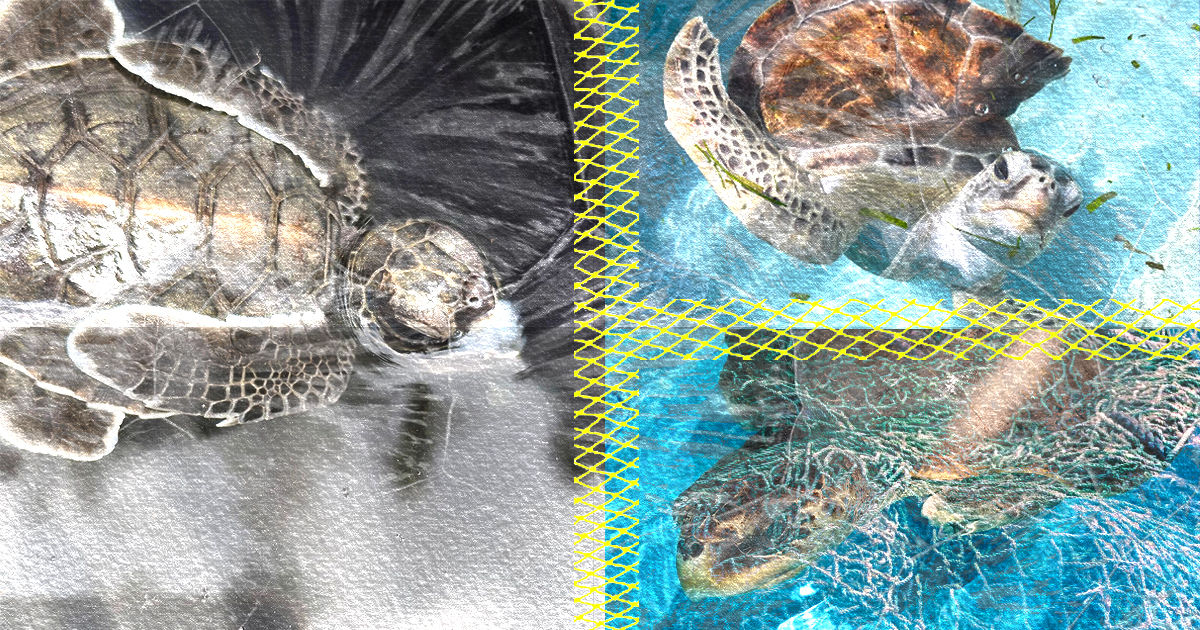
Artwork: Dosain
16 Jun 2025, 15:05
On World Sea Turtle Day, the Atoll Marine Centre, a locally managed marine conservation and sea turtle rehabilitation facility in Lhaviyani Naifaru, warns that the survival of sea turtles – which hold significant ecological and cultural value in the Maldives – now depends on actively enforced protection and conservation.
The sea turtle lottery
Can you imagine if humans gave birth to a hundred children at once, left them on their own from day one, and hoped one of them might grow to have children of their own?
For sea turtles this is not fiction; it's strategy! Like us, sea turtles are slow-growing and long-lived. They take decades to reach maturity and when they do, they often go back to the beach where they were born. But unlike humans, who spend years raising just a handful of children, sea turtles lay hundreds of eggs per season and leave them entirely to fate. It is estimated that only one in every 1,000 hatchlings survives into reproductive adulthood. This harsh reality is all part of their reproductive strategy; the problem comes when this already low survival rate decreases even further due to the many anthropogenic threats that sea turtles now face.
Sea turtles attract tourists to the Maldives and feature prominently in Maldivian folklore and traditions. Despite their vital role in marine ecosystems, green sea turtle populations in the Maldives have declined by an estimated 70 to 78.3 percent since the 1980s. For the critically endangered hawksbill sea turtles, this decline exceeds 95 percent. These alarming figures highlight the urgent need to address the many threats sea turtles face today.
The illegal pet trade
Taking sea turtles or their eggs from the wild, and selling them or keeping them as pets, have been fully banned since 2016 under the Environmental Protection and Preservation Act. However, the practice still continues.
The Atoll Marine Centre has rescued 239 hatchlings from the illegal pet trade over the past decade. Despite the legal protections in place, many people remain unaware that this is a problem, or don’t fully understand how harmful it truly is.
Sea turtles are wild animals whose biology is finely tuned for life in the ocean. Keeping hatchlings in captivity, even for just a few days, can have far more serious consequences than most people realise. When hatchlings emerge from their nests, they carry energy reserves from the egg, which fuel an intense swimming period known as the swimming frenzy. During this critical window, they must reach offshore currents that offer both food and relative safety. Any delay in this journey, such as time spent in a tank, can drastically reduce their chances of survival.
In addition, many misinformed pet owners unknowingly keep hatchlings in freshwater, which prevents them from developing their salt glands, essential for surviving in the ocean’s salinity. They are also often unable to meet the hatchlings’ complex dietary needs, leading to malnutrition and digestive issues. What may seem like a harmless or even caring act can ultimately become a barrier to survival; both for the individual animal and for a species already on the brink.
Keeping sea turtles as pets can also cause lifelong health complications. Improper handling can lead to deformities such as lordosis: a curvature of the spine that can affect the turtle’s ability to swim and dive properly. This condition not only reduces life expectancy but also makes the animal extremely vulnerable in the wild. In many cases, it results in a lifetime of captivity for a creature that was meant to swim free in the open ocean.
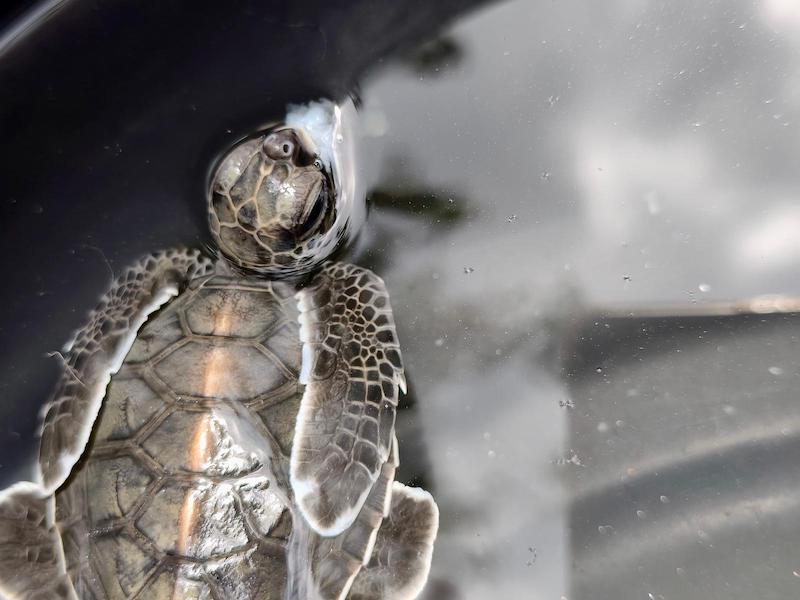
Hope's story
Hope is a five-year-old green sea turtle who has never seen the ocean. She arrived at the Atoll Marine Centre as a post-hatchling, suffering from lordosis due to being mishandled and kept as a pet. Today, she’s one of the centre’s most charismatic residents. Visitors are instantly drawn to her playfulness and charm, but her friendliness stems from the fact that captivity is the only life she’s ever known.
Because of her condition, Hope requires attentive care and is far too vulnerable to survive in the ocean. She will never get the chance to live as a wild sea turtle. Her story is heartbreaking. But it also serves as a powerful reminder of why sea turtles don’t belong in tanks, and why keeping them as pets robs them of the life they are meant to live in nature.

Ghost gear entanglement
While bycatch – the unintentional capture of non-target species in unselective fishing operations – remains one of the most significant threats to sea turtles worldwide, there is a quieter side to this industry that threatens sea turtles, away from boats and human observation: ghost fishing.
Over the past eight years, ghost gear has been the leading cause of admission for juvenile and adult sea turtles at the Atoll Marine Centre, accounting for an estimated 75 percent of their cases. The term refers to fishing gear that has been abandoned, lost, or discarded at sea, and continues to trap marine life long after it stops serving any human purpose.
Nets, lines, and traps drift silently with ocean currents, entangling anything in their path. Sea turtles, especially Olive Ridleys that inhabit the open ocean, are particularly vulnerable. Entangled turtles often suffer severe injuries; most lose at least one flipper, and many arrive with deep wounds, infections, or amputated limbs.
With timely rescue and proper rehabilitation, many entangled sea turtles can recover and return to the ocean. Some have even been successfully released into the wild after losing multiple flippers. But not all victims are found in time, and for some, the damage is too severe to allow survival in the wild.
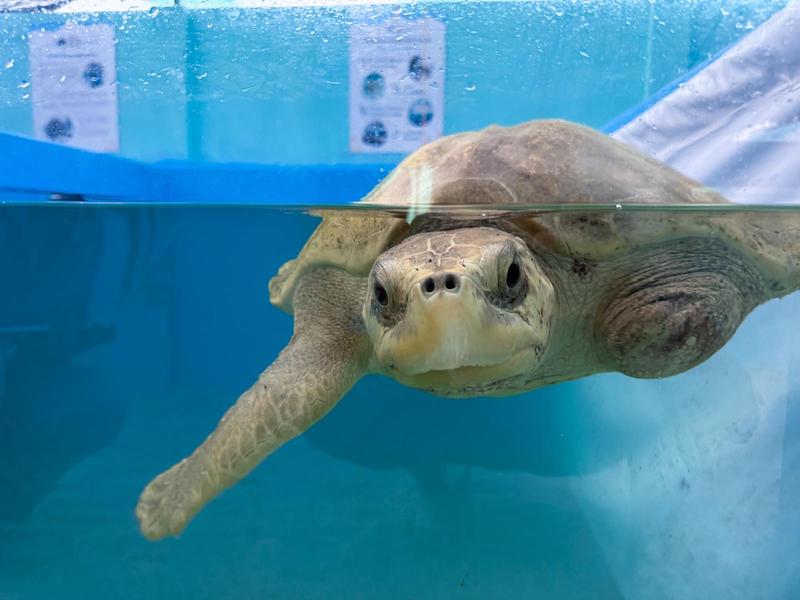
Cora´s story
Cora was rescued in 2022 by the water sports team at Cora Cora Resort in Raa atoll. He was found floating at the surface, tightly entangled in a ghost net that had already caused the amputation of his two front flippers while in the water.
For sea turtles, the front flippers are essential for propulsion, while the back flippers are mainly used for steering. Without his front limbs, Cora is not able to swim against the ocean currents, which makes him, unfortunately, an unreleasable turtle. The stress from the entanglement also caused him to develop buoyancy syndrome, a condition that prevents him from diving, which is a vital part of any sea turtle’s natural behaviour.
Cora now lives under expert care where he continues his rehabilitation. While he may never return to the wild, ongoing treatments, including external targeted weight therapy and enrichment feeding, are helping him relearn how to dive, which would significantly improve his quality of life in captivity.
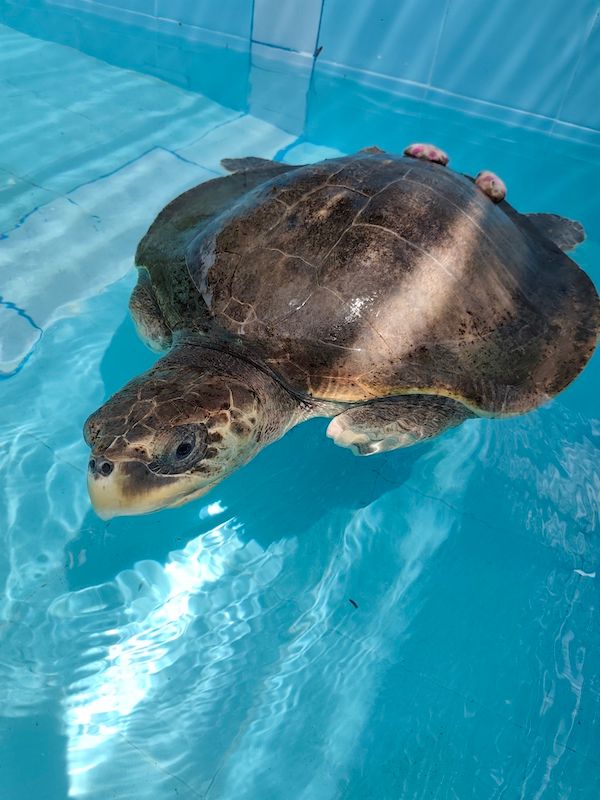
These are not the only threats that sea turtles face in the Maldives
Despite legal protections, enforcement is weak: they are still hunted for their meat, and their eggs are frequently poached from unmonitored nests for consumption. Their habitats are degraded or destroyed, often cleared by resorts or coastal developments aiming for clearer waters, which leads to the removal of vital seagrass meadows that turtles depend on.
Sea turtles are also particularly vulnerable to boat strikes, as they must regularly surface to breathe; and the ingestion of plastic pollution and other foreign materials mistaken for food causes them severe injuries or even death.
How we combat these threats
Besides sea turtle rehabilitation, the Atoll Marine Centre works hand in hand with the local community to protect wild turtles from pollution. From beach cleanups on local and uninhabited islands to underwater cleanups during snorkels and dives, every effort helps remove harmful waste from the ocean, especially ghost nets, which frequently wash up on our shores and pose a deadly risk to marine life if left unchecked. Some of these nets are given a second life as upcycled bracelets, turning a threat into a tool for awareness.
Atoll Marine Centre also partners with Parley Maldives to recycle plastics labeled one, two, and five collected during cleanups, and offer local residents a sustainable way to dispose of these materials in Naifaru. Outreach is a core part of AMC's mission. The organisation regularly engages with local communities to raise awareness about the impact of keeping sea turtles as pets, and the vital role these animals play in maintaining healthy marine ecosystems.
Leading up to World Turtle Day this past May, AMC collaborated with the Olive Ridley Project on a social media awareness campaign focused on the illegal pet trade of turtles. The campaign reached a wide audience and was a resounding success. But it also revealed how little the public still knows about this important threat to sea turtles.
To support frontline response efforts, AMC also offers free sea turtle rescue and response training for water sports and excursion staff at resorts in the Maldives, equipping them with the knowledge to act efficiently and safely when they encounter a turtle in distress, to help increase the chances of successful rehabilitation and release.
The greatest challenge
Sea turtles have navigated Earth’s oceans for over 100 million years, surviving natural predators, shifting climates, and mass extinctions. But the biggest threats they now face are human-made, and their survival depends on human action.
In the Maldives, where sea turtles hold ecological, cultural, and economic importance, protecting them is essential for a sustainable future. Whether you're a visitor, a local, or an advocate abroad, your choices matter. Support local conservation, say no to wildlife exploitation, and help keep the oceans clean for the sake of sea turtles and all other marine life.
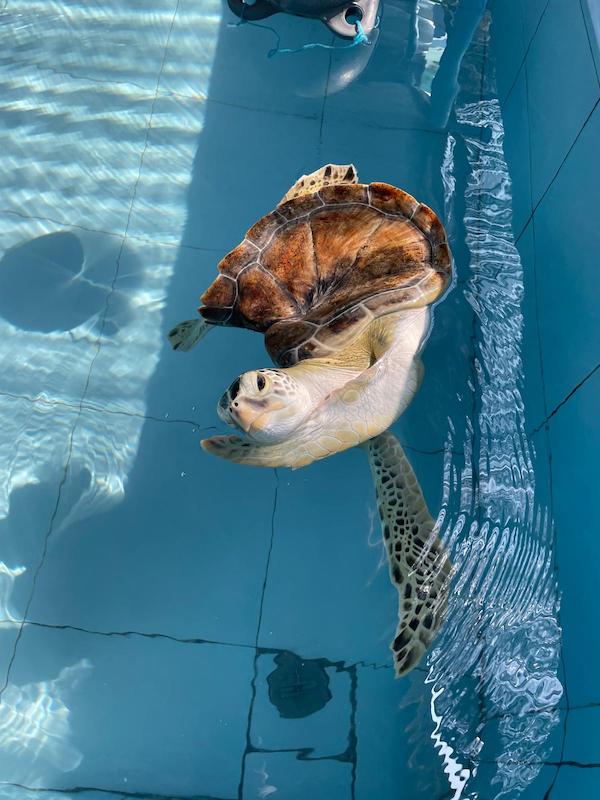
All comment pieces are the sole view of the author and do not reflect the editorial policy of the Maldives Independent. If you would like to write an opinion piece, please send proposals to editorial@maldivesindependent.com.
Discussion
No comments yet. Be the first to share your thoughts!
No comments yet. Be the first to join the conversation!
Join the Conversation
Sign in to share your thoughts under an alias and take part in the discussion. Independent journalism thrives on open, respectful debate — your voice matters.




